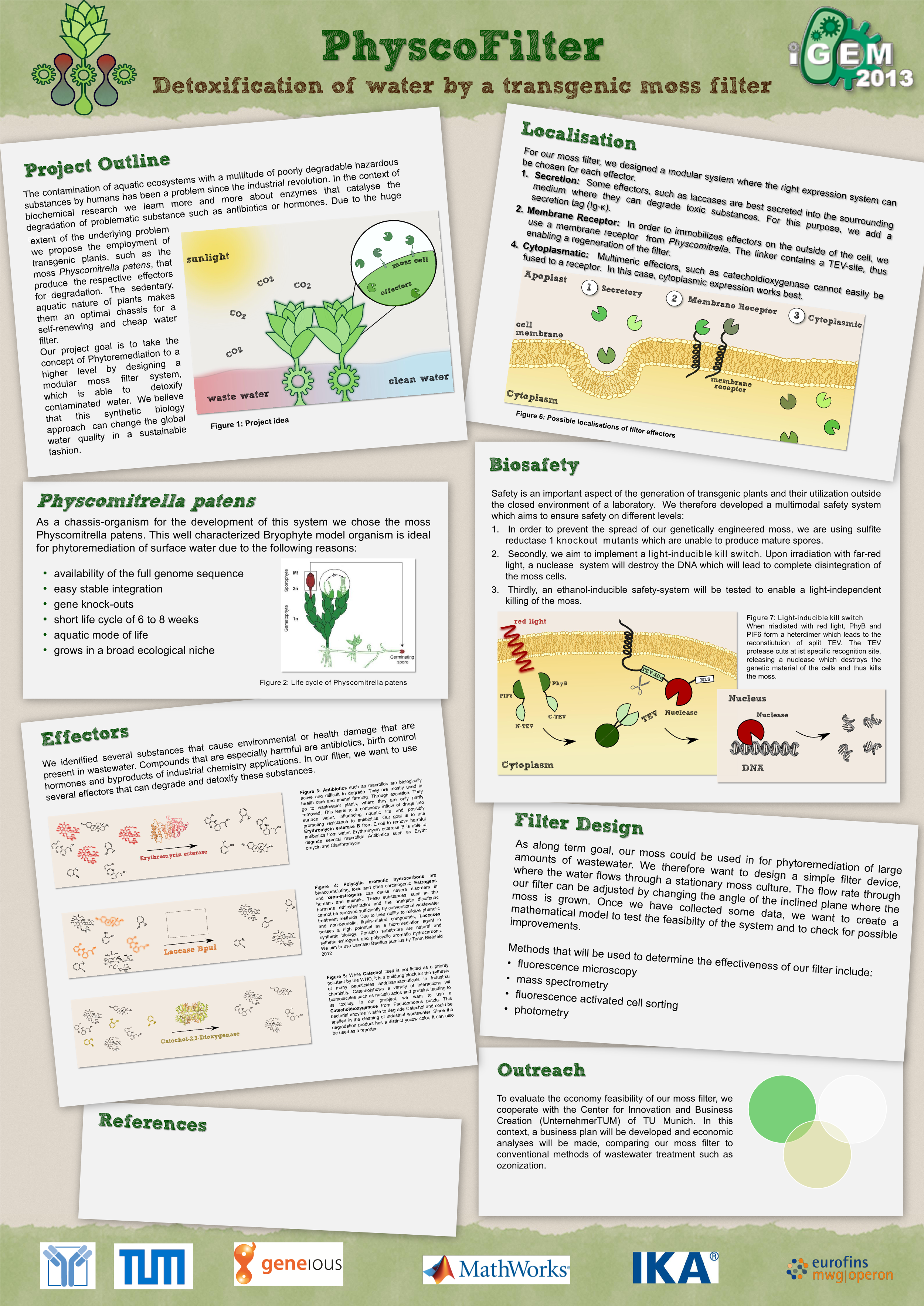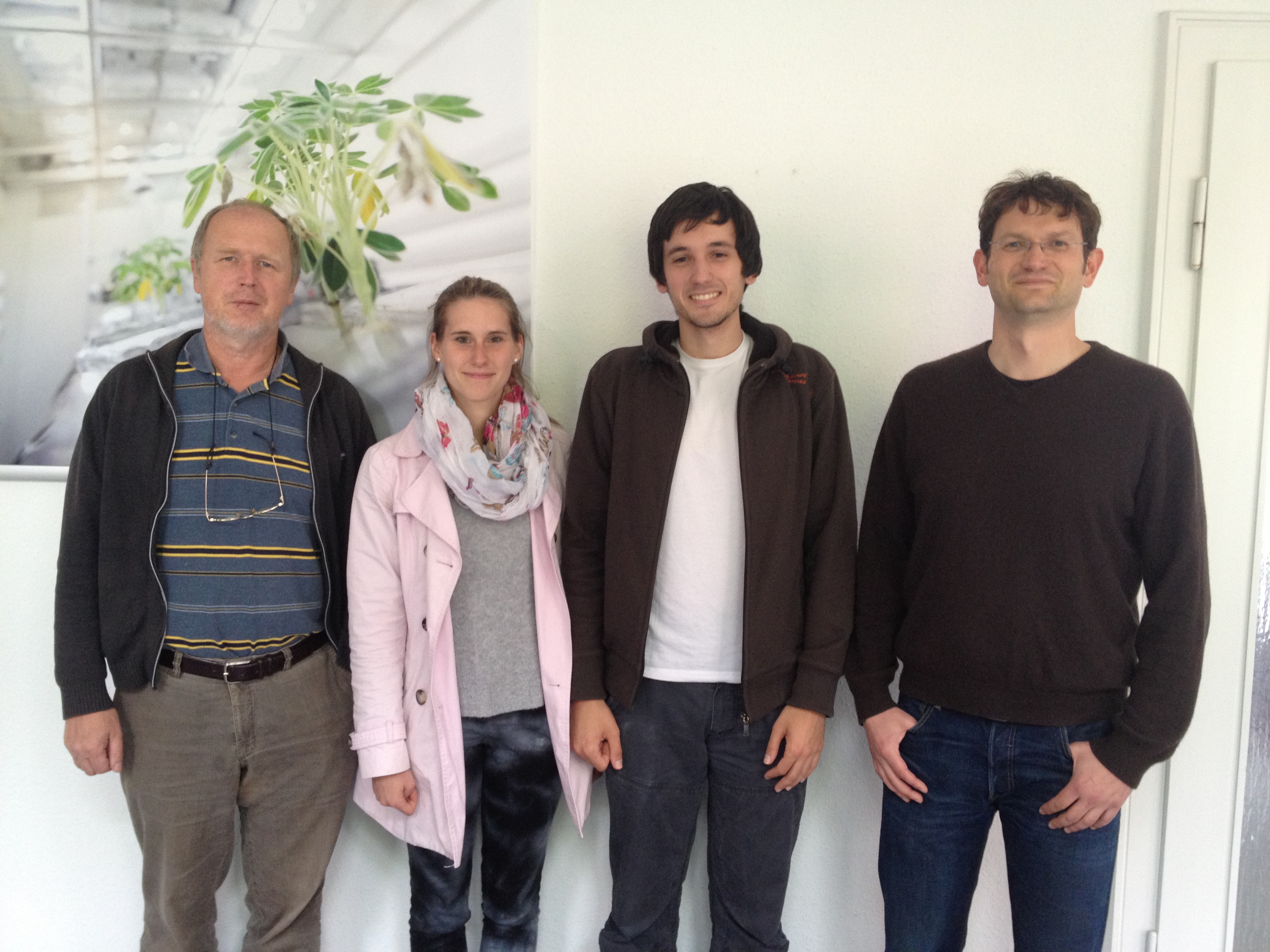Team:TU-Munich/HumanPractice/Interviews
From 2013.igem.org
(→Participation on the 4 th Water Research Horizon Conference “Water Scarcity and Global change” in Berlin) |
|||
| Line 44: | Line 44: | ||
In summary the visit of the UFZ enriched us in the molecular genetics part and in the view of further project thoughts. The leadership through the laboratories of UFZ showed us exemplary demonstrative a conversion of phytoremediation. | In summary the visit of the UFZ enriched us in the molecular genetics part and in the view of further project thoughts. The leadership through the laboratories of UFZ showed us exemplary demonstrative a conversion of phytoremediation. | ||
| - | |||
| - | |||
| - | |||
| - | |||
| - | |||
| - | |||
| - | |||
| - | |||
| - | |||
| - | |||
| - | |||
| - | |||
| - | |||
| - | |||
| - | |||
Revision as of 19:13, 3 October 2013
Expert Counsel: An overview
1 Biotechnology 2020+ Conference of the Ministry of Research and Education

For the third year in series the German Ministry of Research and Education invited all German iGEM Teams to join the "Biotechnology 2020+ conference" in Berlin on June 27th http://www.biotechnologie2020plus.de "Biotechnology 2020 conference". “Which products and biotechnological processes are fundamental? “, “How will the next generation accept the biotechnological processes?” and “Which projects are already initiated?”. Experts in the fields economy, politics and science and the German iGEM teams came together at the conference and tried to answer these questions. In his speech, Dr. Helge Braun (parliamentary State Secretary of the BMBF) emphasized that a creative teamwork with an own developed language is necessary and introduced the new biotechnological ideas: biological implant, biomimetric desalination plant and microbial fuel cell. In the first discussion round about the topic “result of the previous activities and recommendations for action for the continuation of the initiative "Biotechnology 2020+ conference"" five ambassadors of five research institutions (Frauenhofer Society, Helmholtz Association, Max-Planck Society, Leibniz Association, TU Braunschweig) (see figure 5) presented their recently realized ideas: printable biotechnology, cellfree bioproduction and synthesis of novel therapeutics. Exemplarily Prof. Dr. H. Jäckle (Max-Planck-Community) introduced the research network for Synthetic Biology MaxSynbio. The second discussion treated the subject “Open Source in the Biotechnology”. After the presentation there were workshops workshops on the topic “On the way to a Biotechnology 2020+”, the exhibition of the German iGEM projects 2013 (see Figure 6) and presentations of the research projects of the five research institutions.
In summary the participation enabled us to get informed about the practicable operated novel biotechnology ideas, cooperation and projects from market-leading research institutions in Germany. Furthermore we got in contact with other iGEM teams which paved the way for the second iteration of the German iGEM day.
2 Workshop "Drugs in the Environment" in Berlin
At the end of May we joined the "Drugs in the environment" conference that was organized by the [http://www.rcds.de/ RCDS] (which is the youth organisation of the CDU, the currently governing political party in Germany) and the [http://www.vfa.de/ German Association of Research-Based Pharmaceutical Companies].
During this discussion meeting we had the possibility to meet and discuss with several experts in the field such as xxx and xx as well as with representatives of leading German pharmacy companies such as Bayer and Novartis.
3 Visit of the Helmholtz Center for Environmental Research (UFZ) in Leipzig
In Addition to present our project the goal of the visit of the Helmholtz Centrum of Leipzig UFZ http://www.ufz.de/index.php?en=2540 UFZ on the 26 th of june 2013 was to get another objective opinion concerning our project idea, project implementation and information about practical Phytoremediation. Dr. Kuschk and Dr. Müller are members of the chair of environmental biotechnology and attend to phytoremediation or rather bioremediation (see figure 6). Their research focus is in the area of zoonosis that means the interplay between plants and microorganisms. The plant acts with the root system as a carrier to quantify the microorganisms which dispose nitrate, sulfur or toluol. Because of lack of personal genetic engineering works in UFZ isn’t possible according to Dr. Kuschk.
Together with a leadership through the laboratories with Dr. Müller (see Figure 7) we had 2 conversations with the contact people in different points of our project. Dr. Müller gave us very helpful annotations relative to our effectors. He mentioned the fact about the sense of amplification of a resistance gene EreB in environment in contrast to the biotechnological benefit. Furthermore he alluded that we had to consider the enzyme specificity, to find out the benefit of extinction of Erythromycin relative to clean water and to inform us about the costs of blue light. Another point was the use of Cathecholdioxygenase. According to Dr. Müller is a depletion of Catechol through microorganisms a very effective process. So our duty was to show the efficiency of the depletion of Catechol through moss.
The main topic we discussed with Dr. Kuschk applied to the application of our project idea in practice outside the competition framework. Dr. Kuschk was in doubt about the practical conversion based on his long lasting experiences and compared to his own developed concepts and conversions. In his opinion the costs, the concentration of the influent and the high duration of dwell of water based on the low concentration of water play a negative role, effect and influence relative to the conversion. Furthermore he prefers biofilms to membrane concerning to the immobilization of substances. Also he criticized our choice of degraded substances. In his opinion fecal substance are the cause of the high rate of death and diseases in developed countries. We explained him that we choose harmful substances according to the WHO with respect to establish our filter and show with the help of few harmful substances the degradation and bioaccumulation of them. In general he saw our project as basic research and not as practical application. In summary the visit of the UFZ enriched us in the molecular genetics part and in the view of further project thoughts. The leadership through the laboratories of UFZ showed us exemplary demonstrative a conversion of phytoremediation.
 "
"









AutoAnnotator:
Follow us:
Address:
iGEM Team TU-Munich
Emil-Erlenmeyer-Forum 5
85354 Freising, Germany
Email: igem@wzw.tum.de
Phone: +49 8161 71-4351